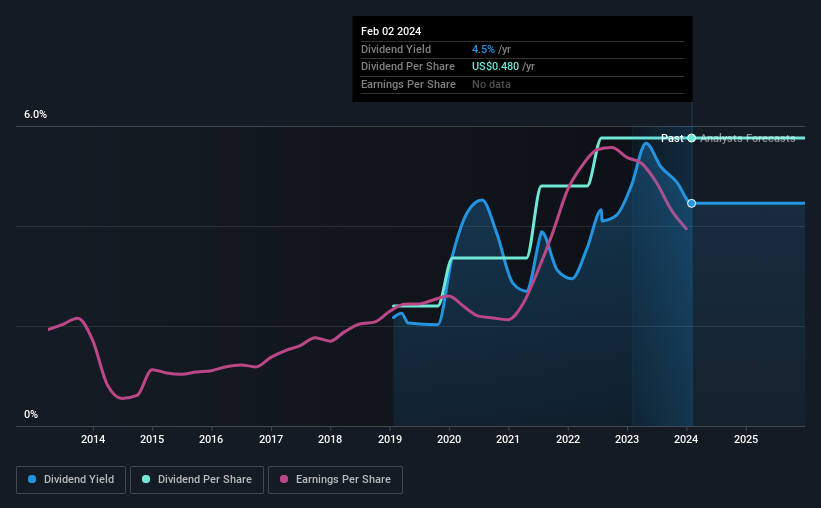Should You Buy OP Bancorp (NASDAQ:OPBK) For Its Upcoming Dividend?
OP Bancorp (NASDAQ:OPBK) stock is about to trade ex-dividend in four days. Typically, the ex-dividend date is one business day before the record date which is the date on which a company determines the shareholders eligible to receive a dividend. The ex-dividend date is important as the process of settlement involves two full business days. So if you miss that date, you would not show up on the company's books on the record date. Thus, you can purchase OP Bancorp's shares before the 7th of February in order to receive the dividend, which the company will pay on the 22nd of February.
The company's next dividend payment will be US$0.12 per share. Last year, in total, the company distributed US$0.48 to shareholders. Based on the last year's worth of payments, OP Bancorp has a trailing yield of 4.5% on the current stock price of US$10.78. Dividends are a major contributor to investment returns for long term holders, but only if the dividend continues to be paid. We need to see whether the dividend is covered by earnings and if it's growing.
View our latest analysis for OP Bancorp
Dividends are typically paid out of company income, so if a company pays out more than it earned, its dividend is usually at a higher risk of being cut. OP Bancorp paid out a comfortable 30% of its profit last year.
When a company paid out less in dividends than it earned in profit, this generally suggests its dividend is affordable. The lower the % of its profit that it pays out, the greater the margin of safety for the dividend if the business enters a downturn.
Click here to see the company's payout ratio, plus analyst estimates of its future dividends.
Have Earnings And Dividends Been Growing?
Stocks in companies that generate sustainable earnings growth often make the best dividend prospects, as it is easier to lift the dividend when earnings are rising. If earnings decline and the company is forced to cut its dividend, investors could watch the value of their investment go up in smoke. For this reason, we're glad to see OP Bancorp's earnings per share have risen 12% per annum over the last five years.
Many investors will assess a company's dividend performance by evaluating how much the dividend payments have changed over time. OP Bancorp has delivered 19% dividend growth per year on average over the past five years. It's great to see earnings per share growing rapidly over several years, and dividends per share growing right along with it.
To Sum It Up
Should investors buy OP Bancorp for the upcoming dividend? Typically, companies that are growing rapidly and paying out a low fraction of earnings are keeping the profits for reinvestment in the business. Perhaps even more importantly - this can sometimes signal management is focused on the long term future of the business. OP Bancorp ticks a lot of boxes for us from a dividend perspective, and we think these characteristics should mark the company as deserving of further attention.
So while OP Bancorp looks good from a dividend perspective, it's always worthwhile being up to date with the risks involved in this stock. Be aware that OP Bancorp is showing 2 warning signs in our investment analysis, and 1 of those is a bit unpleasant...
If you're in the market for strong dividend payers, we recommend checking our selection of top dividend stocks.
Have feedback on this article? Concerned about the content? Get in touch with us directly. Alternatively, email editorial-team (at) simplywallst.com.
This article by Simply Wall St is general in nature. We provide commentary based on historical data and analyst forecasts only using an unbiased methodology and our articles are not intended to be financial advice. It does not constitute a recommendation to buy or sell any stock, and does not take account of your objectives, or your financial situation. We aim to bring you long-term focused analysis driven by fundamental data. Note that our analysis may not factor in the latest price-sensitive company announcements or qualitative material. Simply Wall St has no position in any stocks mentioned.

